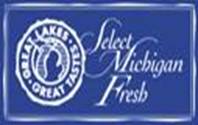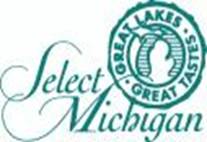3. Select Michigan Products
 Back in the 70's and 80's, my wife and I lived an
organic lifestyle. We subscribed to Mother
Earth News and practiced organic gardening and living
methods from the magazine. I would double dig our small garden, and we spent
hours working together. We dried our own food, made organic baby foods, canned,
picked rose hips for tea, and made our own jams and preserves. In the late 80's
we stopped receiving the magazine when they switched to a new glossy print
version. Now that information is available on the Internet, I've come back to
the magazine. The organic lifestyle is not for everyone. And, for those of you
that don't know, I've become morbidly obese since getting away from that
lifestyle. (more about that another time)
Back in the 70's and 80's, my wife and I lived an
organic lifestyle. We subscribed to Mother
Earth News and practiced organic gardening and living
methods from the magazine. I would double dig our small garden, and we spent
hours working together. We dried our own food, made organic baby foods, canned,
picked rose hips for tea, and made our own jams and preserves. In the late 80's
we stopped receiving the magazine when they switched to a new glossy print
version. Now that information is available on the Internet, I've come back to
the magazine. The organic lifestyle is not for everyone. And, for those of you
that don't know, I've become morbidly obese since getting away from that
lifestyle. (more about that another time)
In "No
Impact Man" we learned that Colin Beavan was purchasing
all food within 250 mile of Manhattan.  Purchasing
food locally in Michigan is considerably easier. The food is fresher and not
only will decrease your carbon imprint, it will also improve the economy.
Michigan has a thriving Community Supported Agriculture (CSA), organic, and
farm produce program. There are over 100 places listed on the State of Michigan
website.
Purchasing
food locally in Michigan is considerably easier. The food is fresher and not
only will decrease your carbon imprint, it will also improve the economy.
Michigan has a thriving Community Supported Agriculture (CSA), organic, and
farm produce program. There are over 100 places listed on the State of Michigan
website.
Not sure when or what to buy? Here's some information on Michigan Produce Seasons. From the State
website, there is also a list of Michigan Farm Markets and U-Picks. FoodRoutes.org
is also a good source for organic and non-organic locally produced food.
 Look for the three seals scattered on this
page to verify you are purchasing a certified Michigan product. These seals
were found on the State of Michigan Department of Agriculture website. Every
purchase, brings the State that much further from the "Giant Sucking Sound" of
spiraling unemployment and decreasing home values.
Look for the three seals scattered on this
page to verify you are purchasing a certified Michigan product. These seals
were found on the State of Michigan Department of Agriculture website. Every
purchase, brings the State that much further from the "Giant Sucking Sound" of
spiraling unemployment and decreasing home values.
Do you have a source not in this article? Please include a
link with your comments
4. Nature and Nurture LLC, a local organic landscape gardening business
is looking to fill two full time positions and one part-time position.
Job
Description:
Landscape
maintenance including: weeding, mulching, pruning, spring and fall cleanups,
and more. Landscape installation including: planting perennials and trees,
working with rocks, tree/shrub/weed removal, and more. Rainy day work may
include computer work and cleaning/organizing trucks, tools, and office space.
Minimum
Qualifications:
a.. Interest
in organic gardening, landscaping, and/or ecological restoration b.. Strong and
in good physical condition c.. Self-motivated and reliable d.. Willingness to
perform assigned tasks
Additional
Qualifications:
a..
Experience doing strenuous physical labor
b.. 2 year
commitment
c.. Ability
to identify common garden weeds
d..
Landscaping, gardening, or farming experience
e.. Office
organizational skills.
f.. Basic
computer (PC) skills.
Please send a
resume (email is fine) with a cover letter and 3 references:
Nature and
Nurture, LLC
114 8th St.,
Ann Arbor, MI 48103
(734)
929-0802
5. Nature and Nurture LLC, a local organic landscape
gardening business is looking to fill two full time positions and one part-time
position.
Lots
of tricky raw milk info to make sense out of.
First, I’ll start with the hot info, about settlement
discussions in the case of Family Farms Cooperative and Richard Hebron,
reported in today’s Ann
Arbor News (and commented on by several readers following my
most recent posting).
I have been following this situation since shortly after the sting operation
last Oct. 13, and in the last few weeks, I have been in
frequent contact with several of the principal players. They had asked me to
hold off on writing anything because the case has been moving through several
sensitive stages, and they didn’t want a possible settlement to be
compromised by publicity.
The article in the Ann Arbor paper has put the whole matter in the
public forum, though, and it may actually be misleading in certain respects.
So, I’ll try to set the record straight as much as I can, without
compromising the discussions currently ongoing.
First, my sense of the situation is that the settlement talks are
moving more smoothly than the Ann Arbor article lets on. I am led to believe
that the Michigan Department of Agriculture (MDA) has indicated a willingness
to drop some of its original demands, though I’m not sure which ones they
are. But they’re enough to give all parties hope that a reasonable
agreement can be struck.
Second, it’s important to understand that the reason
settlement talks are being held at all is that county prosecutors in Cass and
Washtenaw counties have been reluctant to file criminal charges against Richard
Hebron. They have essentially put the onus on the MDA to come to a settlement
and get them out from under the embarrassment of having to go after a
hard-working and honest farmer.
Third, it appears that cow-share agreements are not targeted by
the MDA, and thus will continue to be permitted.
Finally, it’s necessary to remember that even if a
reasonable settlement is arrived at between MDA and FFC/Hebron, there is still
that prickly little matter of the federal Food and Drug Administration’s
warning letter to David Hochstetler, the Indiana farmer who supplies FFC with
its raw milk. That letter warns Hochstetler against interstate shipments of raw
milk. FFC has been in discussions with the FDA about the warning letter, and
has submitted extensive legal arguments requesting that the federal agency
re-consider. The FDA isn’t known for its swift responses (it took three
months to reply to Michigan Sen. Carl Levin’s questions about the Hebron
case), so it could be a while before we know what’s happening. My point
here is that a satisfactory settlement in Michigan doesn’t necessarily
mean a happy ending in this case.
* * *
I suspected there were enough mathematicians among readers to make
sense of the debate in Maryland about sickness from raw milk, and I was right
(see my most recent posting). The comments helped open my eyes about how
figures can be twisted and turned. I can appreciate Melissa Herzog’s
viewpoint, though as I’ve stated before, and as Ken reiterates, it’s
dangerous to make policy based on a few dramatic situations. I also appreciate
that there are weaknesses in the data extrapolated by the author of the
Maryland article, but unfortunately, data about the number of raw milk drinkers
is difficult to come by, as is reliable information about the number of
confirmed illnesses.
I think what
opened my eyes, though, is the fact a lot of people are definitely drinking raw
milk in California, with few serious problems. Yes, the serious problems have
been very serious, as we’ve learned on this blog. It’s also
important to keep in mind that large-scale consumption of raw milk is a recent
phenomenon (since pasteurization took hold in the early and middle twentieth
century). That’s all the more reason to keep learning from the experiences
of Organic Pastures and other farmers.
6. Market Farm Forms
by Marcie
Rosenzwieg
NOW AVAILABLE
AGAIN! And just in time for this season. Market Farm Forms by
Marcie
Rosenzweig. Contains computer spreadsheet templates for planning and
organizing
information on diversified market farms. This software program will
help you in
planning crops and budgets, order seed and soil amendments, grow
transplants,
project yields and income, and then track what really happens
against your
projections. Works on PC or Mac. Exclusively available from
Back 40.
University purchase orders o.k. We have a long list of customer who
have been
begging us to make this available again and Marcie is now able to
provide us
with a limited stock. Orders received now will be shipped by the
end of this
month. Quantity discounts available for class use.
Herman
Beck-Chenoweth
Resilience
Research Farm
HYPERLINK
"http://lists.mutualaid.org/mailman/listinfo/fingerlakespermaculture"
Herm.NaturesPace at earthlink.net
Ph:
573.858.3559
Vicki Morrone
Organic Vegetable and Crop Outreach Specialist
Michigan State University
C.S. Mott Sustainable Food Systems
303 Natural Resources Bldg.
East Lansing, MI 48824
517-353-3542
517-282-3557 (cell)
517-353-3834 (fax)
http://www.MichiganOrganic.msu.edu/
http://www.mottgroup.msu.edu/
